Downloads Keep Stopping on Origin? Here’s How to Fix It
Some PC users are reporting that every attempt at downloading games through Origin ends up with the download speed gradually decreasing before eventually going to 0 KB/s and stopping in its tracks. This problem is reported to occur on Windows 11 as well as on Windows 10 and Windows 7.
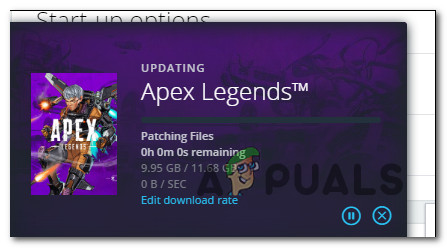
After we’ve investigated this particular issue thoroughly, it turns out that there are several common different underlying causes that will end up creating this particular issue. Here’s a list of potential culprits that are most likely contributing to the Origin’s inability to download game files:
- Dynamic IP glitch – One of the most common reasons that will ultimately create this issue is a Dynamic IP change that ended up affecting the downloaded. In this particular case, all you need to do is force the download to stop before starting it again from the Origin interface.
- Missing Admin access – If you notice that the download doesn’t start at all (the speed remains at 0 B / sec), another viable scenario that might be causing this issue is a scenario in which the app is missing administrative access. In this case, you can fix the problem by forcing the main Origin executable to open with admin access.
- Origin version not compatible with OS – If you’re on Windows 11, chances are the issue appears due to the fact that the app is not fully compatible with the latest insider builds of the newest operating system from Microsoft. To avoid these types of problems, you’ll need to run Origin in compatibility mode with an older OS.
- Ongoing Origin server issue – It’s not uncommon to face this type of issue due to an Origin server problem that is entirely beyond your control. If every game download you initiate triggers the same behavior, you should take the time to investigate if other users in your area are currently dealing with the same type of issues.
- Antivirus / Firewall interference – There are a couple of problematic antivirus suites (with a firewall component) that are commonly being reported for interfering with Origin’s downloads. Unfortunately, the only fix in these types of scenarios is to temporarily disable the overprotective suite or uninstall it.
- Different 3rd party program interference – Besides AV and firewall suites, there’s another category of programs known to interfere with Origin’s downloads. System optimizer apps are often being flagged for blocking the connection with the download servers. This type of issue can be avoided entirely by deploying a clean boot operation.
- UPnP is Disabled – If your router supports UPnP but this feature is disabled, chances are the Origin downloads are failing because the required ports are not being forwarded automatically. To fix this problem, all you need to do is enable the Universal Plug and Play feature from your router settings.
- UPnP is not supported by router – If you’re using an older router model that doesn’t support (UPnP) or it’s making the firmware update to support it, you will likely need to forward the used ports (by origin) manually before you’ll be able to download stuff normally via Origin.
- Corrupted temporary file – As it turns out, another potential reason why you might see this type of issue occurring is a scenario in which temporary files associated with Origin are actually preventing the download from starting. Fixing the issue, in this case, is as simple as clearing the temp file cluster.
- Remnant Origin service – As it turns out, you can also expect this type of problem to occur due to a remnant Origin service that is actually interfering with the download instead of facilitating it. EA is now revamping the app, so if this scenario is applicable, you should be able to fix the download issues by disabling the Origin Client service from the Services screen.
- Corrupted game file – If you’re only experiencing this type of issue with one game while every other game you attempt to download works just fine, you should delete a file from the problematic game (or rename one of the folders). Doing this will serve the purpose of alerting the Origin app, forcing it to re-check and re-download all the files associated with that game.
Now that we went over every potential cause of this particular issue (it’s a long list, I know), let’s get to the actual steps that will help you fix the issue indefinitely and download the game using Origin normally.
Pause and Resume the download (temporary fix)
Before you try anything else, our recommendation is to start simply by pausing the download before resuming it after 1 minute or so.
This definitely a temporary fix as it doesn’t fix the underlying issue, but it might allow you to download the game that you’re eager to play without forcing you to go through dozens of potential repair strategies before you manage to identify the culprit.
To pause the download that is currently causing the issue, expand the download section (bottom-left section) and click on the pause icon.
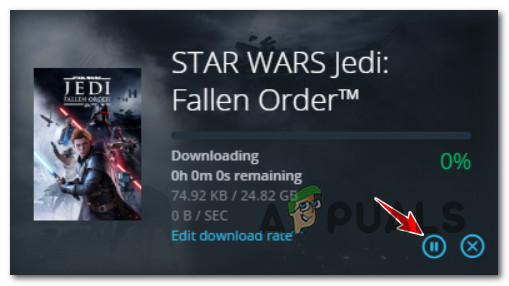
After the download is stopped, wait for a full minute before clicking on the pause button once again to resume the download.
Immediately after clicking on this button, you should see a spike in the download speed before it gradually reverses back to 0 B /s.
Note: You can repeat the process several times until the download is complete and you can play the game.
However, even if this method allows you to complete the download, you should still consider fixing the issue permanently by troubleshooting using the remaining methods below.
Run Origin with admin access
If the first method was a bust or you’re simply looking for a permanent fix, the next thing you should do is make sure that the main Origin executable has admin rights.
The download function on your Origin installation might be affected if your UAC (User Account Settings) prevents it from opening with admin access.
You can force the admin access on the Origin executable by right-clicking on it and choosing Run as Administrator from the context menu.
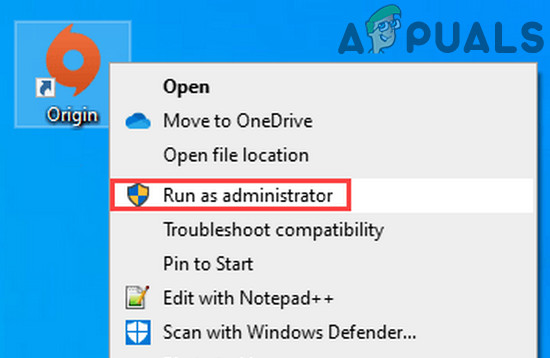
Now that you’ve opened Origin as administrator, resume the download and see if the download speed issue is now fixed.
If it’s indeed fixed, you can actually make sure that the problem doesn’t repeat in the future by manually configuring Origin to open up with admin access at every startup.
Follow the instructions below for specific instructions on how to do this:
- Start by making sure that Origin is closed and not running in the background.
- Right-click on the main Origin executable and choose Properties from the context menu that just appeared.
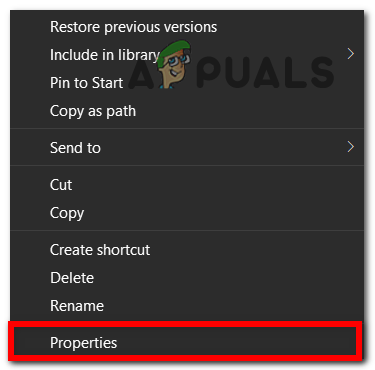
Access the Properties screen - Once you’re inside the Properties screen, access the Compatibility tab from the menu at the top, then check the box associated with Run this program as administrator (under Settings) and press Apply to save the changes.
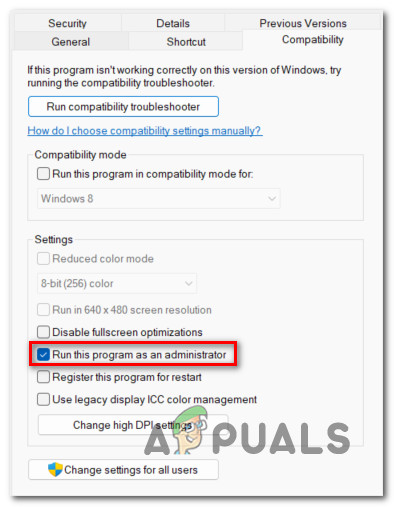
Running this program as an administrator - Launch Origin normally and see if the problem is fixed.
If this method has not fixed the issue in your case or you discovered that the program was already running with admin rights, move down to the next potential fix below.
Run Origin in Compatibility Mode (Windows 11 Only)
If you recently established that missing administrative privileges is not responsible for this type of issue, the next thing you should do (if you’re on Windows 11) is to force the launcher to run in compatibility mode with Windows 10 or Windows 8.1.
Several affected users that we’re also dealing with this issue have confirmed that once they finally resolved the download issue with Origin once they modified the default behavior of the main executable so that it runs in compatibility mode with an older operating system.
Follow the instructions below for specific instructions on how to do this:
- First things first, ensure that Origin is closed and not running in the background.
- Right-click on the main Origin executable and click on Properties from the context menu that just appeared.

Access the Properties screen - Once you’re inside the properties screen, access the Compatibility tab and start by checking the box associated with Run this program in compatibility mode for (under Compatibility Mode).
- Next, use the drop-down menu that was just made available to select Windows 10 or Windows 8.
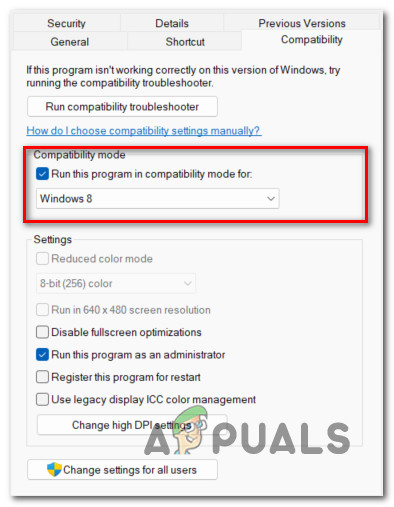
Running in compatibility mode - Next, hit Apply to save the changes, then launch Origin once again and see if the problem is now fixed.
If you’re still seeing the download speeds going down before eventually stopping on Origin, follow the instructions below.
Check for an Origin server issue
If you’ve come this far without a resolution, you should take the time to investigate whether the issue is related to an ongoing server issue that is beyond your control.
Before moving down to the next potential conflicts that might interfere with the download function of Origin, take the time to visit directories like DownDetector and IsTheServiceDown to see if other users in your area are also dealing with this type of issue.
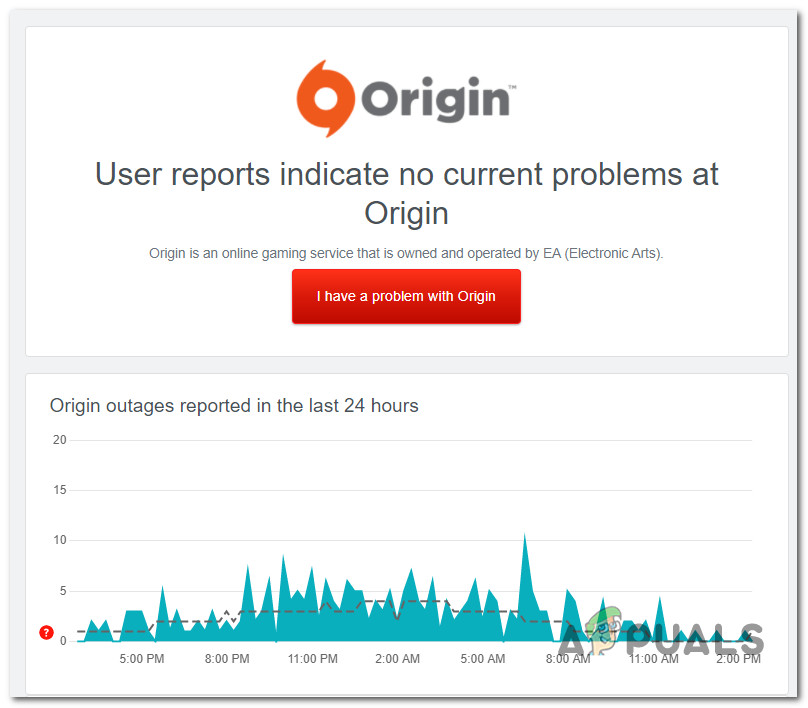
Note: If you discover that there’s indeed an issue affecting the download function of Origin, there’s nothing you can really do other than wait until the issue is fixed.
On the other hand, if you just confirmed that the problem is not related to a server issue, move down to the next potential fix below.
Disable / Uninstall 3rd party antivirus or firewall (if applicable)
If you’re using a 3rd party Antivirus with a firewall component or a dedicated firewall suite, you should also take the time to ensure that it’s not interfering with the download function inside Origin.
Tools like Zone Alarm and Sophos are often reported for causing download issues with Origin, Steam, and GoG.
Note: If you’re not using a 3rd party firewall, skip this method altogether and move directly to the next guide below.
In most cases, you can resolve these problems by disabling the real-time protection via the taskbar icon of your AV.
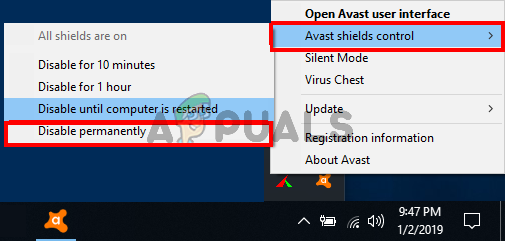
Note: Depending on the AV suite that you’re using, you might not be able to disable the real-time protection directly by right-clicking the tool’s icon. In this case, you should look for an option to do it from the settings menu.
Once you do this, start Origin once again and initiate another download to see if the problem has been fixed.
But keep in mind that if you’re using an individual third-party firewall, you’ll likely need to uninstall the tool to figure out if it’s indeed interfering with the download.
Follow the instructions below for instructions on uninstalling the overprotective firewall:
- Press Windows key + R to open up a Run dialog box. Next, type ‘appwiz.cpl’ and press Enter to open up the Programs and Features menu. If you’re prompted by the User Account Control (UAC) window, click Yes to grant admin access.
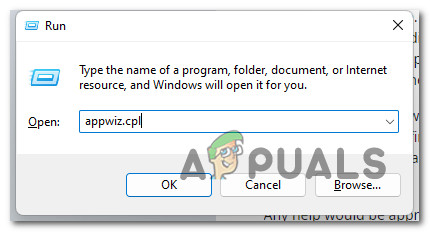
Open up the Programs and Features menu - Once you’re inside the Programs and Features menu, scroll down through the list of installed programs and locate the firewall installation that you suspect is conflicting with Origin.
- Right-click on it and choose Uninstall from the context menu that just appeared.
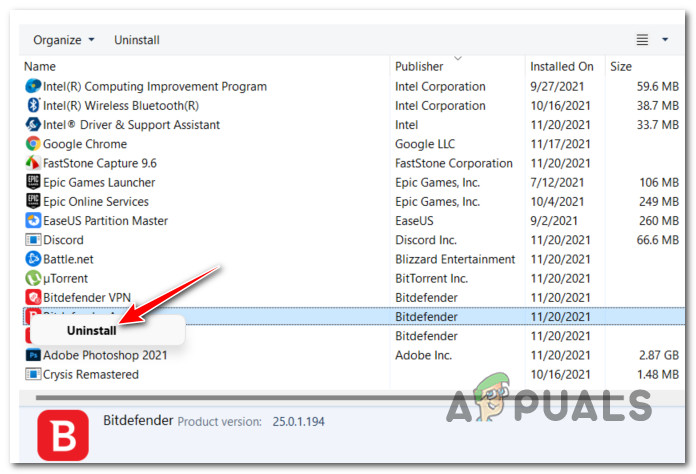
Uninstall the problematic firewall - Complete the remaining uninstallation steps, then reboot when prompted to do so.
- Once the next startup is complete, launch Origin once again and see if the problem is now fixed.
In case the same type of issue is still persisting or this method was not applicable, move down to the next potential fix below.
Download from a clean boot
Keep in mind that your antivirus or firewall is not the only 3rd party tool that might end up interfering with the download protocol that Origin uses. There are certain system optimizing programs that might also cause this behavior as some affected users have reported.
Additionally, there might be other conflicts that the community has not yet discovered. Because it’s virtually impossible to create a definitive list of every potential culprit, the best method to figure out if this has a 3rd party cause is to boot your PC in a clean boot state.
If you’re looking for specific instructions on doing a clean boot, follow this step-by-step article.
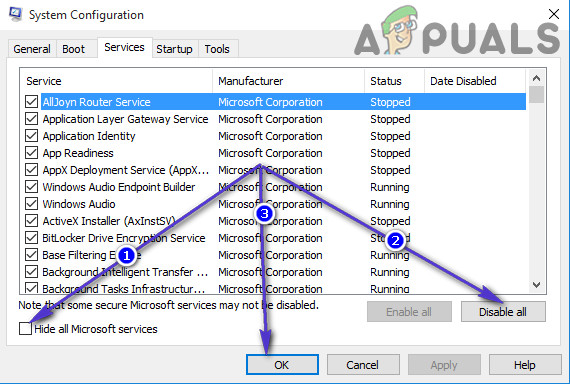
Once you achieved a clean boot state, launch Origin once again and see if you’re still dealing with the same download issue.
If this problem is still not fixed, move down to the next potential fix below.
Enable UPnP (if applicable)
This problem might also be rooted in a network issue. The Origin downloads might ultimately fail because the ports that the client uses are not being forwarded by your router.
But this is a non-issue if your router supports UPnP (Universal Plug and Play) and the feature is enabled from your router settings.
Note: UPnP is an industry-agreed protocol that enables routers to automatically forward the ports used by trusted applications.
Follow this article to enable UPnP on any router model.
Once you manage to enable UPnP, launch Origin once again and see if the problem is now fixed.
If your router does not support UPnP, move down to the next method for a manual way of forwarding the ports used by origin.
Forward the ports used by Origin (if applicable)
If you previously realized that your router does not support UPnP, the only viable alternative at this point is to manually forward the ports used by Origin.
This operation is done from your router settings and will ensure that all the TCP and UDP ports used by the game launcher are forwarded and easily accessible.
Note: Only follow this method if enabling UPnP (see above) is not an option on your router model.
To forward the ports used by Origin, you’ll need to access the settings menu of your router and manually forward a couple of ports.
Follow the instructions below for step-by-step instructions on how to do this:
- Make sure the PC where you’re performing these steps is connected to the network facilitated by your router.
- Open your default browser, then access one of the following addresses and press Enter to access your router settings:
192.168.0.1
192.168.1.1
Note: If you’ve set a custom address for your router, access that instead. You can restore back to the default router address by resetting your router. - At the original login screen, enter the appropriate credentials to gain access to your router settings.
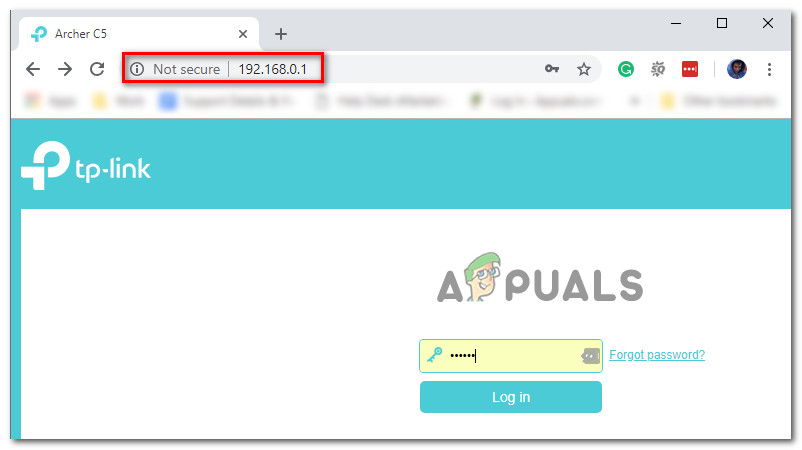
Accessing the router settings Note: Unless you already modified the login credentials of your router, you should be able to complete the sign un process by using admin or 1234 as username and password (most manufacturers abide by this).
- Once you’re finally inside your router settings, access the Advanced Settings menu and look for an option that allows you to forward UDP and TCP ports manually.
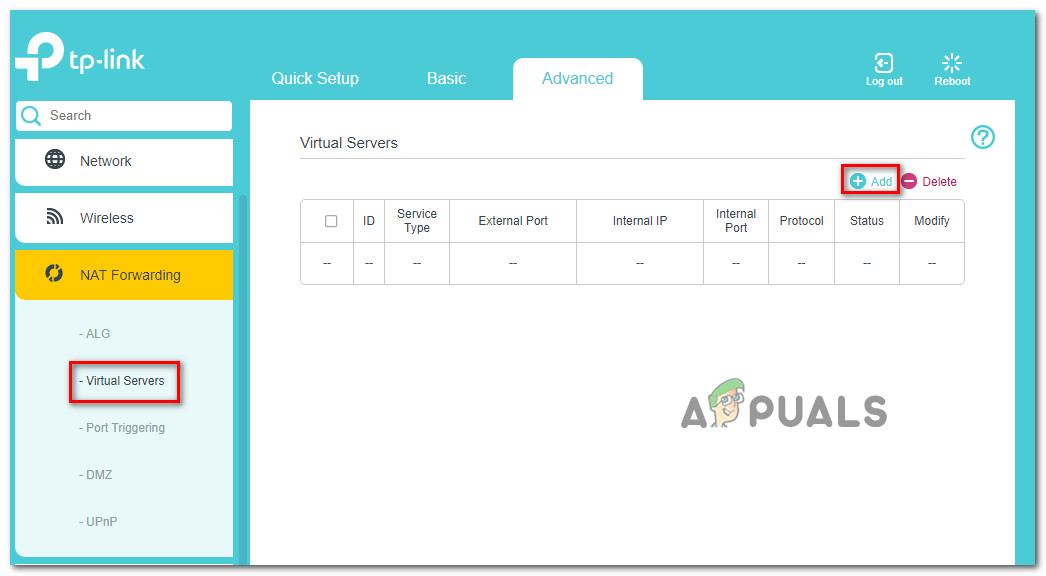
Forwarding ports manually Note: The naming conventions will be different across different manufacturers, so expect your screen to be different.
- Next, make sure the following Origin-related TCP and UDP ports are all properly forwarded:
TCP: 80; 443; 9960-9969; 1024-1124; 18000; 18120; 18060; 27900; 28910; 29900. UDP: 1024-1124; 18000; 29900.
- Once every required port is manually forwarded, reboot your router once again and initiate another download to see if the issue is now fixed.
If this issue is still not fixed, move down to the next potential fix below.
Clear the temp folder
Another potential reason why you might notice the Origin download function acting up is due to some currently stored temporary data that is currently residing inside the Temp folder of your Windows installation.
Several affected users that we’re finding themselves in a similar situation have confirmed that they finally managed to fix the issue by accessing the Temp folder and clearing its contents – upon doing this and restarting, most users have reported this issue to be fixed.
Follow the instructions below for specific instructions on clearing the Temp folder:
Note: The instructions below will be for every recent Windows version.
- Press Windows key + R to open up a Run dialog box.
- Next, type ‘%temp%’ inside the text box and press Ctrl + Shift + Enter to open up the Temp directory of your Window installation.
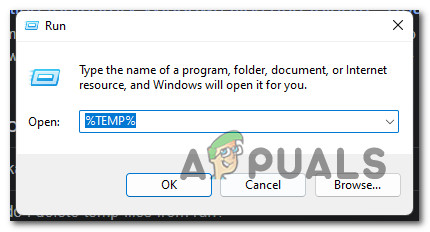
Opening the Temp folder - Once you’re inside the Temp folder, press Ctrl + A to select everything inside, then right-click on a selected item and choose Delete from the context menu that just appeared.
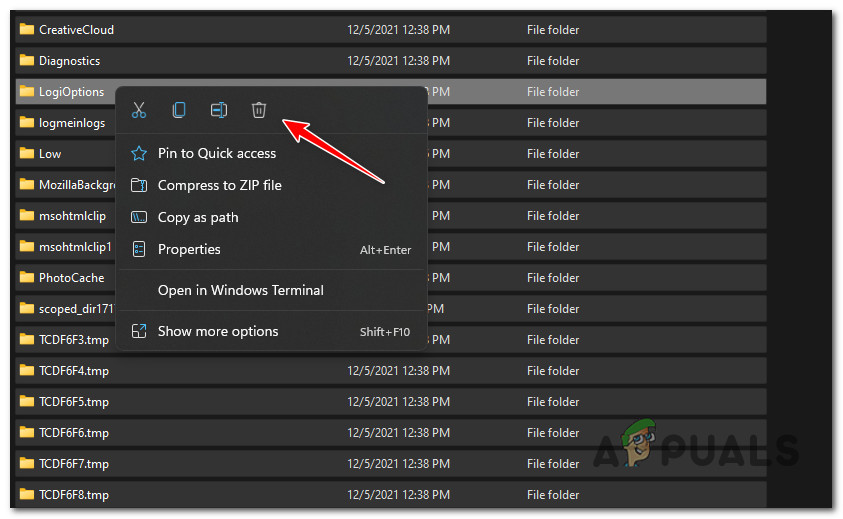
Delete the contents of the Temp folder - Once the contents have been cleared, reboot your PC and launch Origin once again to see if the problem is now fixed.
If the same kind of issue is still occurring even after you’ve cleared the contents of the Temp folder, move down to the next potential fix below.
Disabling the Origin Client Service
This might seem like a counter-intuitive thing to do but, some users that were previously unable to download games via Origin have finally managed to fix the issue by disabling the Origin Client Service via the Service screen.
This is effective because EA is in the middle of migrating to a new program architecture, so this particular service is no longer effectively needed.
Note: This might soon change as new updates are released for Origin.
Follow the instructions below to disable the Origin Client Service using the Services Windows tool:
- Press Windows key + R to open up a Run dialog box. Next, type ‘services.msc’ and press Enter to open up the Services window.
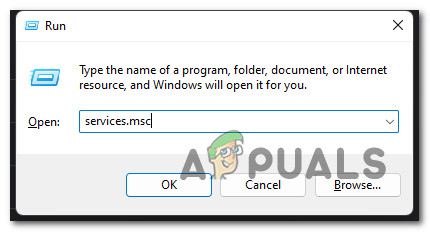
Opening the Services screen - When you’re prompted by the User Account Control, click Yes to grant admin access.
- Once you’re inside the services screen, scroll down through the list of services and locate the service named Origin Client Service.
- When you see it, right-click on it and choose Properties from the context menu that just appeared.
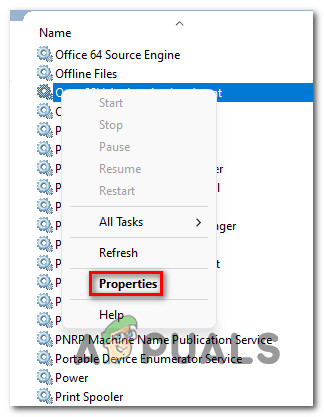
Accessing the Properties screen - Once you’re inside the Properties menu, access the General tab, then change the Status type to Disabled and click on Apply to save the changes.
- After the Origin Client Service service has been disabled, reboot your PC and see if the problem is now fixed.
If you’re still unable to download new games and updates via Origin, move down to the final potential fix below.
Delete a game file (or rename the game folder)
If none of the methods above have worked for you, we’re already burned through pretty much every fix that Origin’s support team recommends.
But there are also a few other things that the Origin community has found helpful when troubleshooting this particular issue:
- Deleting a game file – Some users have discovered that simply deleting one random file from the Origin-generated downloaded folder might restart the download. This serves the purpose of forcing Origin to acknowledge that some game files are missing and trigger a repair operation.
- Renaming the game folder – If the first method didn’t work, another thing you should try is to rename the game folder of the game that refuses to download. This will force the Origin installer to ignore the folder and create a new one as a result.





